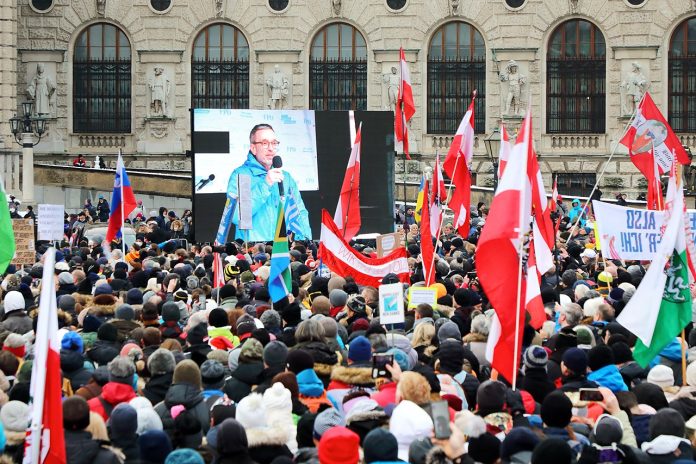Austria faced a major political crisis in 2019, known as IbizaGate. The scandal involved Heinz-Christian Strache, the former Vice Chancellor and leader of the far-right Freedom Party (FPÖ), and his parliamentary leader, Johann Gudenus. In a video recorded during their vacation in Ibiza, Spain, the two FPÖ leaders were seen offering state contracts to a representative of Vladimir Putin in exchange for political support in the elections.
The two politicians stepped down from their positions following a public scandal that caused significant electoral harm to their party during the snap elections held that same year. The Freedom Party of Austria (FPÖ) received 16.2% of the national votes.
Despite the scandal’s potential threat to Austria’s security, FPÖ now leads the polls with a 29% preference rate, surpassing the Socialists (23%) and the People’s Party (22%). Notably, the People’s Party experienced a substantial decline, given that they received 37.5% of the vote during the 2029 snap elections.
The FPÖ was founded in 1956 by a former SS officer and is known for its xenophobic, anti-immigration, and anti-EU views. Between 2017 and 2019, it was a partner in Sebastian Kurz‘s government.
However, under its new leader, Herbert Kickl, the party has become even more radicalised. Kickl strongly opposes immigration, believes that Islam has no place in Europe, wants Austria to withdraw from human rights agreements, and opposes the use of COVID-19 vaccines. In early 2023, Kickl launched a poster campaign under the slogan “Fortress Austria – closed borders – security guaranteed.”
In an interview with European Interest in November 2021, political scientist and University of Salzburg professor Reinhard C. Heinisch stated that Kickl aims to increase the strength and voter base of the FPÖ by adopting a more radical stance, explicitly targeting the large anti-vaccination demographic, which accounts for approximately 35% of potential voters compared to the FPÖ’s current 20% share.
Now, a video made by the party’s youth organisation – Freedom Youth – published on the YouTube channel “FPÖ TV” on Sunday, August 27, glorifying fascist thinkers and making knowing nods to the country’s Nazi past drew violent reactions.
Migrants have already replaced white Europeans.
The video portrays Freedom Youth as an organisation that is confronted with environmental pollution, inflation, “gender madness,” “rainbow terror,” and “population exchange,” resulting in a future without hope due to prevailing politics. The video mostly features male adolescents and young adults participating in courses, demonstrations, and being in the forest with torches.
According to the extremist conspiracy theory spred by the video migrants have replaced white Europeans and the FPÖ youth is “Austria’s last chance.”
Images of riots and the burning Notre Dame Cathedral in Paris are contrasted with those of folk dances and soldiers, while talk of a “multicultural dystopia” persists.
The storm is mainly directed at links but also figuratively at journalists. However, the hardline leader of the Freedom Party, Herbert Kickl, defended the video, calling it “great.”
A threat for Austria, a danger for Europe!
Politicians from democratic parties have condemned the video and messages sent by the FPÖ. Chancellor Karl Nehammer, who is conservative, led the criticism by stating that the video is designed to scare people and uses images from the past. The SPÖ said the video has led to concerns that political adversaries are intimidated.
It is interesting to note that far-right parties in Europe tend to tone down their rhetoric as elections approach. However, the FPÖ has taken a different approach, despite the next elections being over a year away. Whether this was a political misstep or a reflection of the Austrian voters’ shifting attitudes towards far-right ideologies, only time and upcoming polls will reveal the answer.
The democratic political parties in Austria need to be clear about their plans regarding a future government coalition with the FPÖ.
Recently, Friedrich Merz, the chairman of CDU – the largest opposition party in Germany – promised to not collaborate with the far-right AfD in any capacity. In an interview with the German broadcaster ARD on Sunday, Merz emphasised that the CDU, a sister party of the Austrian conservatives, has a strict policy against working with the AfD in parliament or local councils.
Will Karl Nehammer, the leader of the Austrian People’s Party, provide specific information about the party’s intentions?

